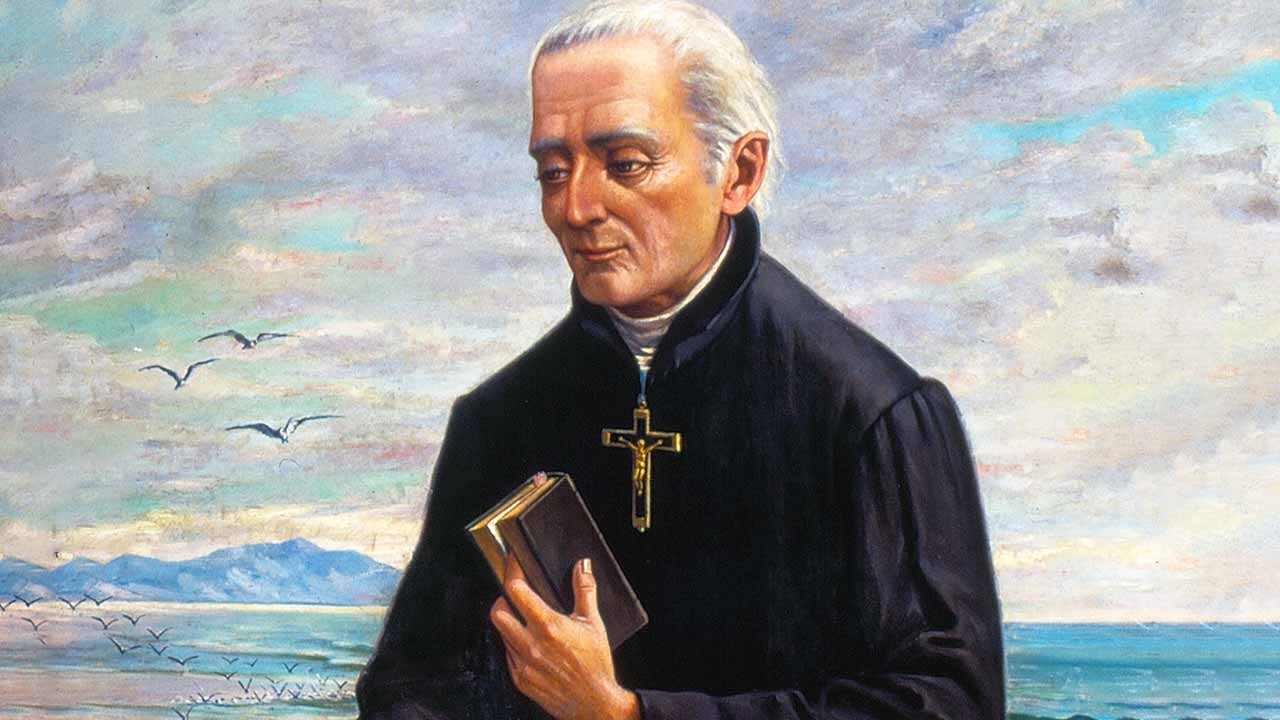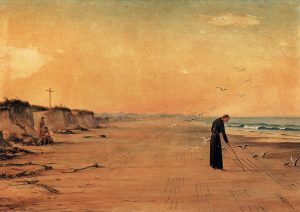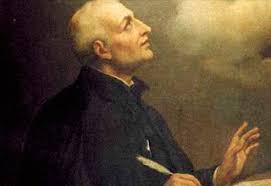
St. José de Anchieta was a religious and a pioneering missionary priest. José was born in 1534 at Tenerife on the Canary Islands, then a Spanish Colony. José’s parents were Juan Anchieta and Mencia Díaz, wealthy landowners who had left their native Basque Country in northern Spain. Juan’s father was a relative of (St.) Ignatius of Loyola. José was very devout in his faith and a gifted student, especially excelling in linguistics and writing. As a teen, he went to the University of Coimbra in Portugal, where he mastered the Portuguese language.
CALL TO THE PRIESTHOOD
He became acquainted with the Jesuits there, and discerned a call to the priesthood. He made a private vow of chastity while in prayer before an image of the Virgin Mary. He was accepted at the Jesuit College at Coimbra and became a Jesuit in 1551 at age seventeen. José practiced some harsh penances, and this contributed to an injury and an illness while he was a novice. He developed a scoliosis, or curvature of his spine, and was very limited in the classes he was able to take. He did, however, master Latin, making him able to read, write, and converse in three languages.
SENT AS A MISSIONARY
In 1532, the Portuguese had established their first settlement in Brazil. In 1553, the Jesuits sent their third group of missionaries to Brazil. Believing that José’s health would improve in that climate, his superiors included him with that group. After a difficult ocean crossing, the group landed at São Vicente. José quickly befriended the Tapuia natives, and within six months, had mastered their Tupi-Guarani language. He wrote a grammar for that language. Manuel da Nóbrega was the Jesuit provincial superior in Brazil, and he realized that José was especially gifted, and chose him as his interpreter.
FOUNDING OF SAO PAOLO
Manuel decided that the mission of evangelization needed to move inland, and a group of thirteen Jesuits settled on a plateau overlooking the Tietê River. There, they offered the first Mass on the feast day of St. Paul and named the mission there after him. By 1554, a Jesuit college had been established there.

The mission had much work to do. The Portuguese were setting a poor example for the native peoples, including keeping them as slaves and/or concubines. The secular priests were reluctant to address the settler’s sinful ways. So, in addition to having to evangelize the native people, the missionaries had to try to bring the European settlers back to God’s ways. Manuel and José made a very good team. While Manuel used his skills as a good administrator and emissary, it was José who was the true missionary. He taught the native people the basics of the Christian faith and much more. To attract them away from such practices as cannibalism and polygamy and toward a more stable life, José and the other Jesuits taught them basic agriculture, as well as such skills as masonry and carpentry.
A MAN OF MANY TALENTS

José was especially effective with the children, using skits and singalongs to teach the Faith. He wrote plays, mostly associated with prominent feasts of the Church, for the community to take part. He had also mastered methods of simple surgeries and the effective use of herbs for healing, which was very helpful, especially for the many natives in remote areas. In the 1550’s, a terrible conflict erupted between the Tamoya and Tupi tribes, complicated by the presence of French Protestant Huguenots and Portuguese Catholics. Manuel and José were held hostage, and tried to bring peace. José’s skill with multiple languages was key to restoring a temporary peace in 1564. During the months he was held captive, José created a Latin poem in honor of the Virgin Mary, which he wrote each day in the sand and then memorized. After the conflict, he wrote the four thousand line poem from memory. In 1566, José was ordained a priest.
HEAD OF A COLLEGE AND PROVINCIAL
In 1570, Fr. Jose succeeded Manuel da Nóbrega as head of the Jesuit college that had been established at Rio De Janeiro. From that base, he traveled extensively, by ship and on foot, throughout Brazil to help establish the missions, believing that true apostles do their work on foot, like the original twelve. In 1577, he succeeded Manuel da Nóbrega as the provincial head of the Brazilian Jesuits. Exhausted and always in poor health, he requested retirement in1591. He died at Reritiba (now Anchieta, Brazil) on June 9, 1597 at age sixty three, and thousands of natives came to mourn him.

St. José de Anchieta is widely known as The Apostle to Brazil. As a good Jesuit, he wrote frequently to his superiors, leaving a well-written account of both colonial and tribal life as well as plant and animal life in 16th century Brazil. He also wrote prolifically in the Tupi language: plays, poetry, and religious education. He is considered the founder of Brazilian literature, and his Tupi grammar served generations of missionaries and natives. Especially venerated in both Brazil and the Canary Islands which both have shrines to his memory, his name is also attached to such institutions as hospitals and schools. He is the patron of catechists and he was canonized by Pope Francis in 2014.
